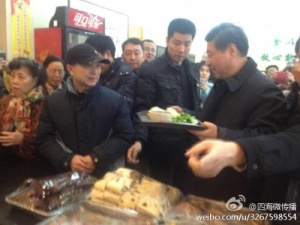“Steamed Bun Xi”的版本间的差异
来自China Digital Space
| 第9行: | 第9行: | ||
Weibo users [http://chinadigitaltimes.net/2013/12/xi-jinping-eats/ searched for symbolic meaning in the dishes Xi ordered]. Mustard greens (''jiècài'' 芥菜) sounds like "beware of wealth," perhaps a signal that Xi was serious about cracking down on official corruption. | Weibo users [http://chinadigitaltimes.net/2013/12/xi-jinping-eats/ searched for symbolic meaning in the dishes Xi ordered]. Mustard greens (''jiècài'' 芥菜) sounds like "beware of wealth," perhaps a signal that Xi was serious about cracking down on official corruption. | ||
| − | [[Category: | + | [[Category:Lexicon]][[Category:Party and State]] |
2021年2月2日 (二) 20:45的版本
Xí Bāozi 习包子
Nickname for President Xi Jinping.
In late December 2013, President Xi dined at a Beijing chain restaurant that serves up steamed buns (bāozi 包子) in a room full of surprised patrons. The president waited in line, ordered his meal—six pork and green onion steamed buns, liver soup, and mustard greens—paid, and carried his own tray to a table. Over 400 customers lined up at the Qingfeng Steamed Bun Shop the next day to order Xi’s meal, which soon sold out.
Netizens are of two minds about Xi's lunch: some said it demonstrated his concern for the average Chinese citizen, while others thought it was no more than a "political show" (zhèngzhì zuòxiù 政治作秀). Xi's simple meal recalled the humble lunch of noodles enjoyed by Joe Biden and Ambassador Gary Locke in August 2011, and prompted some netizens to bring up U.S. presidents’ tendency to stage publicity stunts at hamburger restaurants.
Weibo users searched for symbolic meaning in the dishes Xi ordered. Mustard greens (jiècài 芥菜) sounds like "beware of wealth," perhaps a signal that Xi was serious about cracking down on official corruption.





